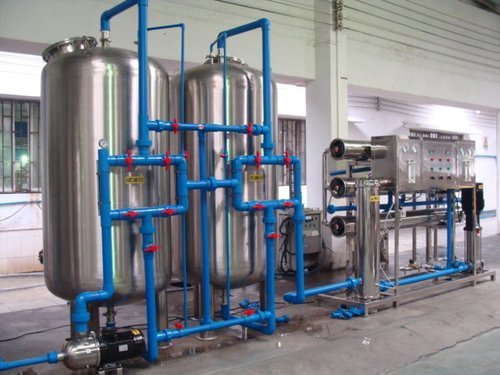The phrase “water is life” rings somewhere only in the corner of your brain, but the reality is that without a good water supply, you die. As such, it’s important to find out what ‘good’ water looks like and how we can purify it for our own safety. In this article, find out about the differences between bottled and tap water, the causes of other contaminants present in municipalities, and how even simple filtration systems can provide great benefits.
What is a water purification system?
A water purification system is a device that helps to remove contaminants from drinking water. This is especially important in areas with high levels of pollution, as chlorine and other chemicals can cause health problems. A WPS can also be used to help preserve water by removing harmful bacteria and algae.
How Does a Water Purification System Work?
Water filtration is one of the most important aspects of having a water purification system. The three main types of water filtration are activated carbon, reverse osmosis, and ultraviolet light. Each has its own set of benefits and drawbacks.
Activated carbon filters are the most common type used in purification systems. They achieve their filtering effect by trapping and removing chemicals, medications, and other contaminants from drinking water. However, activated carbon filters can also remove beneficial minerals such as magnesium and potassium. They are also known to produce unpleasant tasting water due to the presence of chemicals that cause bitter flavors.
Reverse osmosis filters remove water pollutants by passing water through a semi-permeable membrane that allows only certain solutes to cross into the solution on the other side. This leaves most contaminants behind while removing large volumes of water without consuming energy. Reverse osmosis systems are usually more expensive than other types of filtration systems, but they can also provide the cleanest drinking water because they do not require chemical treatment.
Ultraviolet light is another type of water filtration that uses ultraviolet (UV) radiation to kill bacteria and viruses responsible for causing illness. UV radiation is not effective.
The Benefits of a Water Purification System
When you think of water purification, images of developing countries most likely come to mind. However, if you’re like most people in the developed world, your tap water is not always safe to drink. A best water purification system can help make sure that your water is safe to drink and, moreover, it can provide other benefits, such as improved overall hygiene. By following these guidelines, you can create a successful purification system for your home.
RPZ Aqua-Tech provides a full range of residential and commercial purification systems. Our RO systems are designed with an inline filter cartridge for quick and easy installation.
If you’re thinking about installing a new purification system in the near future, our expert staff at RPZ Aqua-Tech can provide you with all the information you need to make an informed decision. Ready to take your drinking quality to the next level? Contact us today!
The basics of a water purification system
A purification system can be a great way to ensure that you and your family are safe from harmful water contaminants. Here are the basics of how these systems work:
-A r purification system removes impurities and bacteria from usable water using activated carbon filters, ultraviolet light, or boiling.
-The most common type of purification system is a reverse osmosis unit, but ozone generators and electronic particle filters are also available.
-Each type of purification system has its own set of benefits and drawbacks, so it’s important to select the one that is best suited for your needs.
Common water filters for homes
There are numerous purification systems that are available on the market today. Each has its own set of benefits and drawbacks. Some common water filters for homes include: reverse osmosis, activated carbon filters, ultraviolet sterilization, and iodine treatment.
Reverse osmosis is the most expensive option, but it has the greatest range of filtering capabilities. It can remove all types of contaminants, including viruses, bacteria, heavy metals, and chemicals. It is also effective at removing alkaline minerals such as calcium and magnesium from water. However, reverse osmosis can be difficult to install and may require professional help.
Activated carbon filters are the cheapest option, but they do not have much ability to remove contaminants other than chlorine and fluoride. They are also difficult to restore after they become clogged.
Ultraviolet sterilization is a low-cost option that is effective at removing bacteria, viruses, cryptosporidium, and protozoa. However, it cannot filter out metals or chemicals. It also requires regular replacement of the filter cartridges.
Iodine treatment is an increasingly popular option because it is very effective at removing bacteria and protozoa. It also has the ability to filter out heavy
The cons of using nonfiltered tap water
If you are like most people, you take for granted the convenience of having readily available and drinkable water. However, what you may not realize is that tap water can also be unhealthy to drink if it’s not properly filtered. Nonfiltered tap water contains chemicals and other pollutants that can have harmful effects on your body. In fact, studies have shown that using a water purification system can help improve your overall health by lowering your risk of developing diseases such as cancer, heart disease, and liver problems. Here are four reasons why you should consider investing in a water purification system:
Improved Overall Health
One of the primary benefits of using a water purification system is that it can improve your overall health. Studies have shown that drinking fluoride-free water can help reduce the risk of developing dental problems such as cavities and tooth decay. Additionally, filtered water is often free of harmful bacteria and viruses, both of which can cause illness if ingested in large quantities. By ensuring that all of the water you consume is filtered and free of contaminants, you can help safeguard yourself against various health risks.
Conclusion
If you find yourself living in an area with water that is not up to par. A purification system can help filter out impurities and toxins from your tap water, making it safer to drink and better for your health. Not only that, but a purification system can also help reduce the number of times you have to run your dishwasher or take care of other cleaning needs related to contaminated drinking water. If you are considering purchasing or installing a purification system, be sure to do your research first so that you pick the right one for your specific needs.








